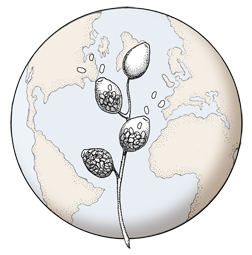References
. Persistence of Phytophthora ramorum and Phytophthora kernoviae in U.K. natural areas and implications for North American forests . 2009 ;Gen. Tech. Rep. PSW-GTR-229:83-84.
. Phosphonate controls sudden oak death pathogen for up to 2 years. California Agriculture [Internet]. 2009 ;63:10-17. Available from: http://ucanr.org/repository/cao/landingpage.cfm?article=ca.v063n01p10&fulltext=yes#
. Phytophthora kernoviae in New Zealand . Phytophthoras in Forests and Natural Ecosystems. 2009 ;General Technical Report PSW-GTR-221:47-53.
. Phytophthora multivora sp. nov., a new species recovered from declining Eucalyptus, Banksia, Agonis and other plant species in Western Australia. Persoonia - Molecular Phylogeny and Evolution of Fungi [Internet]. 2009 ;22:1-13(13). Available from: http://www.ncbi.nlm.nih.gov/pmc/articles/PMC2789538/
. Phytophthora ramorum and Phytophthora kernoviae in England and Wales—Public Consultation and New Programme . 2009 ;Gen. Tech. Rep. PSW-GTR-229:6-14.
. Phytophthora ramorum and Phytophthora kernoviae on naturally infected asymptomatic foliage. EPPO Bulletin [Internet]. 2009 ;39:105–111. Available from: http://dx.doi.org/10.1111/j.1365-2338.2009.02243.x
. Phytophthora rosacearum and P. sansomeana, new species segregated from the Phytophthora megasperma "complex". Mycologia [Internet]. 2009 ;101:129-135. Available from: http://www.mycologia.org/cgi/content/abstract/101/1/129
. Phytophthora siskiyouensis on alders in southern California: an update. 58th Annual Meeting of the California Forest Pest Council, What’s Ailing California’s Forests? 2009 :pg 46-47.
. Population genetic analysis infers migration pathways of Phytophthora ramorum in US nurseries. PLoS Pathog [Internet]. 2009 ;5:e1000583. Available from: http://dx.doi.org/10.1371%2Fjournal.ppat.1000583
. Proceedings of the sudden oak death fourth science symposium. [Internet]. 2009 :378 pp. Available from: http://www.fs.fed.us/psw/publications/documents/psw_gtr229/
. Re-evaluation of Phytophthora citricola isolates from multiple woody hosts in Europe and North America reveals a new species, Phytophthora plurivora sp. nov. Persoonia - Molecular Phylogeny and Evolution of Fungi. 2009 ;22(1):95 - 110.
. Re-evaluation of Phytophthora species isolated during 30 years of vegetation health surveys in western Australia using molecular techniques. Plant Disease. 2009 ;93(3):215 - 223.
Report on the risk of entry, establishment, spread and socio-economic loss and environmental impact and the appropriate level of management for Phytophthora ramorum for the EU. . [Internet]. 2009 ;Deliverable Report 28:311 p. Available from: http://rapra.csl.gov.uk/RAPRA-PRA_26feb09.pdf
Standardizing the nomenclature for clonal lineages of the sudden oak death pathogen, Phytophthora ramorum. Phytopathology [Internet]. 2009 ;99:792-795. Available from: http://apsjournals.apsnet.org/doi/abs/10.1094/PHYTO-99-7-0792
. Stream monitoring for detection of Phytophthora ramorum in Oregon tanoak forests. Plant Disease [Internet]. 2009 ;93:1182–1186. Available from: http://dx.doi.org/10.1094/PDIS-93-11-1182
. A survey of Phytophthora species on Hainan Island of south China. Journal of Phytopathology [Internet]. 2009 ;157:33–39. Available from: http://dx.doi.org/10.1111/j.1439-0434.2008.01441.x
. Survival, dispersal, and potential soil-mediated suppression of Phytophthora ramorum in a California redwood-tanoak Forest. Phytopathology [Internet]. 2009 ;99:608-619. Available from: http://apsjournals.apsnet.org/doi/abs/10.1094/PHYTO-99-5-0608
. Abiotic factors related to the incidence of the Austrocedrus chilensis disease syndrome at a landscape scale. Forest Ecology and Management [Internet]. 2008 ;256:1087 - 1095. Available from: http://www.sciencedirect.com/science/article/B6T6X-4T4JDN7-1/2/6ec5c810e304a848ea7deb23b39e8977
. Alien forest pathogens: Phytophthora species are changing world forests. Boreal Env. Res. 2008 ;13:33–41.
. The biosecurity threat to the UK and global environment from international trade in plants. Plant Pathology [Internet]. 2008 ;57:792–808. Available from: http://dx.doi.org/10.1111/j.1365-3059.2008.01886.x
. Evidence for the role of synchronicity between host phenology and pathogen activity in the distribution of sudden oak death canker disease. New Phytologist [Internet]. 2008 ;179:505–514. Available from: http://dx.doi.org/10.1111/j.1469-8137.2008.02450.x
. First report of chestnut ink disease by Phytophthora katsurae on chestnut in Korea. Plant Disease [Internet]. 2008 ;92:p. 312. Available from: http://apsjournals.apsnet.org/doi/abs/10.1094/PDIS-92-2-0312A
. First report of Phytophthora cactorum associated with beech decline in Italy. Plant Disease. 2008 ;92(12):1708 - 1708.
. First Report of Stalk Rot Caused by Phytophthora tentaculata on Aucklandia lappa in China. Plant Disease [Internet]. 2008 ;92(9):1365 - 1365. Available from: http://apsjournals.apsnet.org/doi/abs/10.1094/PDIS-92-9-1365B



 ]
]